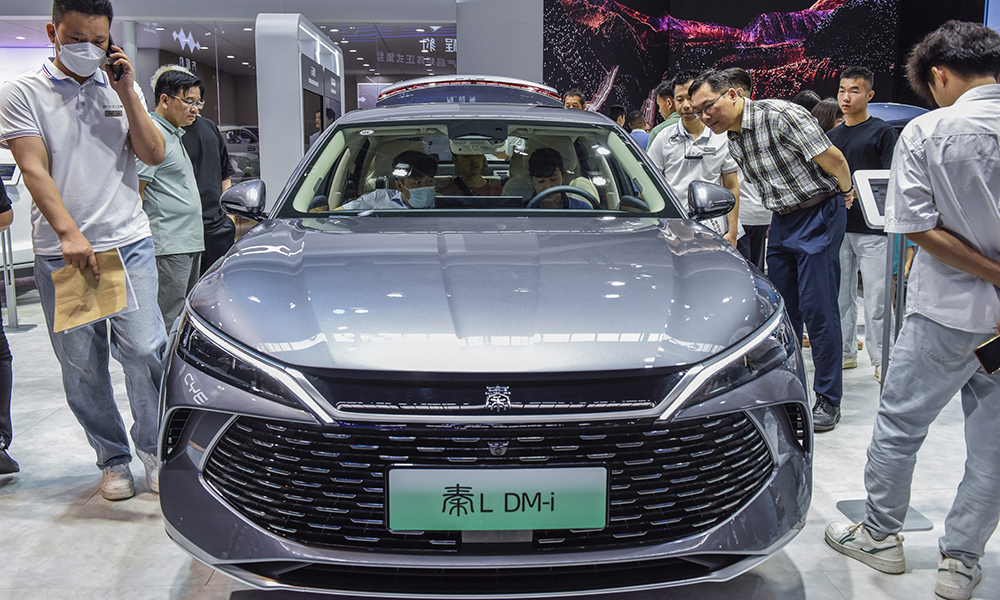
美国银行(Bank of America)的分析师认为,底特律汽车厂商通用汽车(General Motors)、福特(Ford)和Stellantis应该“尽快”放弃竞争激烈的中国市场,并专注于美国市场。
据《底特律新闻》和CNBC报道,美国银行汽车分析师约翰·墨菲在上周二表示:“我们认为,纯粹从利润和战略的角度来看,退出中国市场并专注于有利可图的市场,即北美卡车市场,这是明智的选择。”
通用汽车凭借其百年别克(Buick)品牌在中国市场已有悠久的历史,在2010年代,该公司曾在中国市场获利丰厚,年收益最高曾超过20亿美元,卖出400万辆汽车。
但比亚迪(BYD)和吉利汽车(Geely)等本土汽车品牌的崛起,意味着外国汽车厂商的销量和利润都在下降。2023年,通用汽车在中国的销量降至210万辆,在过去一个季度亏损1.06亿美元,它在过去15年中只有3个季度出现亏损。
福特和原克莱斯勒(Chrysler)的情况甚至更加糟糕。克莱斯勒与法国标致雪铁龙集团(Peugeot Citroën)合并后,现在已更名为Stellantis。这两家公司均未能在中国汽车市场中持续获得重要市场份额。去年,中国的汽车销量高达3,000万辆,创历史纪录,是全球最大的汽车市场。
因此,墨菲认为,未来继续为在中国市场的亏损进行融资,将使三家汽车厂商血本无归。他补充道,这三家公司应该“尽快”离开中国市场,以重新部署资源,专注于开发可与埃隆·马斯克的特斯拉(Tesla)竞争的电动汽车。
墨菲在汽车新闻协会(Automotive Press Association)组织的活动上发言时表示:“专注于核心市场。而且中国不再是通用汽车、福特或Stellantis的核心战略。”他在活动上发布了美国银行的《汽车战争》(Car Wars)年度报告。
如果这三家车企决定彻底离开中国市场,马斯克的特斯拉将成为仅剩的一家在全球三大汽车市场(还包括北美和欧洲)参与竞争的美国汽车品牌。
但通用汽车似乎不打算让马斯克或其中国竞争对手得偿所愿。该公司发言人引述CEO玛丽·巴拉在4月份说过的话称,公司依旧致力于中国市场。在努力降低成本的同时,通用汽车还在中国推出了新产品,包括插电式混合动力车以及Chevy Tahoe和GMC Yukon等豪华进口车型。
而福特在中国市场经过多年亏损后(其中,2022年亏损5.72亿美元)表示,过去三个季度已实现盈利,并且没有离开中国市场的计划。
福特发言人对《财富》杂志表示:“参与全球最大的汽车和电动汽车市场,让我们有机会积累知识,用于领导我们的全球业务,并取得胜利。”
底特律车企对特斯拉望尘莫及,并且仍在为在中国的亏损输血
中国汽车厂商正在有条不紊地挤压较弱的西方汽车品牌的生存空间,主要方式包括招聘欧洲汽车设计师设计时尚的车型,使用低成本劳动力在最先进的工厂内组装等。而且许多品牌通过合资公司转让或直接收购沃尔沃(Volvo)等西方品牌,已经获得了海外开发的技术。
中国消费者对本土科技也抱有较高的期望,他们在微信(WeChat)等无缝应用上花费大量时间和金钱,因此他们对汽车也有同样的期待。
事实上,大众(Volkswagen)长期以来一直是中国汽车市场无可争议的领导者,但其旗下的电动汽车品牌ID却令人失望,原因之一是人们认为其性价比不高。这种感受主要源于其粗糙的信息娱乐系统,以及无法与竞争对手相提并论的软件。
另一方面,率先提出电动汽车远程升级理念的特斯拉,至今依旧具有竞争力,但其硬件(即汽车本身)已经被中国消费者视为平平无奇。此外,除了通用汽车的别克品牌外,福特和克莱斯勒等底特律车企在中国既没有长期发展历史,也没有很高的知名度,更没有技术。
但中国最近因为房地产市场崩溃所引发的通货紧缩,导致了残酷的价格战,许多西方车企无法或者不会跟进。这场价格战甚至迫使本土汽车品牌转战更健康的出口市场。
底特律车企必须做出选择——是继续怀揣全球发展的野心,还是削弱特斯拉在电动汽车生产成本方面的巨大领先优势?
墨菲补充道:“这将对它们最终能否在价格和成本上与特斯拉竞争至关重要。目前以亏损为代价增加销量并没有太大意义。”(财富中文网)
翻译:刘进龙
审校:汪皓
美国银行(Bank of America)的分析师认为,底特律汽车厂商通用汽车(General Motors)、福特(Ford)和Stellantis应该“尽快”放弃竞争激烈的中国市场,并专注于美国市场。
据《底特律新闻》和CNBC报道,美国银行汽车分析师约翰·墨菲在上周二表示:“我们认为,纯粹从利润和战略的角度来看,退出中国市场并专注于有利可图的市场,即北美卡车市场,这是明智的选择。”
通用汽车凭借其百年别克(Buick)品牌在中国市场已有悠久的历史,在2010年代,该公司曾在中国市场获利丰厚,年收益最高曾超过20亿美元,卖出400万辆汽车。
但比亚迪(BYD)和吉利汽车(Geely)等本土汽车品牌的崛起,意味着外国汽车厂商的销量和利润都在下降。2023年,通用汽车在中国的销量降至210万辆,在过去一个季度亏损1.06亿美元,它在过去15年中只有3个季度出现亏损。
福特和原克莱斯勒(Chrysler)的情况甚至更加糟糕。克莱斯勒与法国标致雪铁龙集团(Peugeot Citroën)合并后,现在已更名为Stellantis。这两家公司均未能在中国汽车市场中持续获得重要市场份额。去年,中国的汽车销量高达3,000万辆,创历史纪录,是全球最大的汽车市场。
因此,墨菲认为,未来继续为在中国市场的亏损进行融资,将使三家汽车厂商血本无归。他补充道,这三家公司应该“尽快”离开中国市场,以重新部署资源,专注于开发可与埃隆·马斯克的特斯拉(Tesla)竞争的电动汽车。
墨菲在汽车新闻协会(Automotive Press Association)组织的活动上发言时表示:“专注于核心市场。而且中国不再是通用汽车、福特或Stellantis的核心战略。”他在活动上发布了美国银行的《汽车战争》(Car Wars)年度报告。
如果这三家车企决定彻底离开中国市场,马斯克的特斯拉将成为仅剩的一家在全球三大汽车市场(还包括北美和欧洲)参与竞争的美国汽车品牌。
但通用汽车似乎不打算让马斯克或其中国竞争对手得偿所愿。该公司发言人引述CEO玛丽·巴拉在4月份说过的话称,公司依旧致力于中国市场。在努力降低成本的同时,通用汽车还在中国推出了新产品,包括插电式混合动力车以及Chevy Tahoe和GMC Yukon等豪华进口车型。
而福特在中国市场经过多年亏损后(其中,2022年亏损5.72亿美元)表示,过去三个季度已实现盈利,并且没有离开中国市场的计划。
福特发言人对《财富》杂志表示:“参与全球最大的汽车和电动汽车市场,让我们有机会积累知识,用于领导我们的全球业务,并取得胜利。”
底特律车企对特斯拉望尘莫及,并且仍在为在中国的亏损输血
中国汽车厂商正在有条不紊地挤压较弱的西方汽车品牌的生存空间,主要方式包括招聘欧洲汽车设计师设计时尚的车型,使用低成本劳动力在最先进的工厂内组装等。而且许多品牌通过合资公司转让或直接收购沃尔沃(Volvo)等西方品牌,已经获得了海外开发的技术。
中国消费者对本土科技也抱有较高的期望,他们在微信(WeChat)等无缝应用上花费大量时间和金钱,因此他们对汽车也有同样的期待。
事实上,大众(Volkswagen)长期以来一直是中国汽车市场无可争议的领导者,但其旗下的电动汽车品牌ID却令人失望,原因之一是人们认为其性价比不高。这种感受主要源于其粗糙的信息娱乐系统,以及无法与竞争对手相提并论的软件。
另一方面,率先提出电动汽车远程升级理念的特斯拉,至今依旧具有竞争力,但其硬件(即汽车本身)已经被中国消费者视为平平无奇。此外,除了通用汽车的别克品牌外,福特和克莱斯勒等底特律车企在中国既没有长期发展历史,也没有很高的知名度,更没有技术。
但中国最近因为房地产市场崩溃所引发的通货紧缩,导致了残酷的价格战,许多西方车企无法或者不会跟进。这场价格战甚至迫使本土汽车品牌转战更健康的出口市场。
底特律车企必须做出选择——是继续怀揣全球发展的野心,还是削弱特斯拉在电动汽车生产成本方面的巨大领先优势?
墨菲补充道:“这将对它们最终能否在价格和成本上与特斯拉竞争至关重要。目前以亏损为代价增加销量并没有太大意义。”(财富中文网)
翻译:刘进龙
审校:汪皓
Detroit automakers General Motors, Ford, and Stellantis should abandon the competitive Chinese market “as soon as they possibly can” and focus on the U.S., Bank of America analysts believe.
“We think exiting China from a pure profit and strategic standpoint makes sense, to focus on where you’re making money—which is North American trucks,” John Murphy, BofA auto analyst, said on Tuesday per the Detroit News and CNBC.
Thanks to a long-standing history in China via its century-old Buick brand, GM once minted money in the nation during the 2010s, earning upwards of $2 billion annually at its peak when it sold 4 million vehicles.
But the rising strength of homegrown rivals like BYD and Geely mean volumes and profits are drying up. GM sales in China dropped to 2.1 million vehicles in 2023, and it posted a loss of $106 million in the past quarter—only its third in 15 years.
The situation is even less appetizing at Ford and the former Chrysler group—merged with France’s Peugeot Citroën—now known as Stellantis. The duo have thus far failed to carve out a sustainable and significant share of the local car market, the largest in the world with a record 30 million vehicles sold last year.
As a result, Murphy argued financing losses in China going forward will sap the three carmakers dry. He added they should leave “as soon as they can” in order to redeploy their resources toward developing an EV lineup competitive with Elon Musk’s Tesla.
“Focus on your core,” Murphy said, speaking at an event organized by the Automotive Press Association where he presented the bank’s annual Car Wars report. “And China is no longer a core strategy to GM, Ford, or Stellantis.”
Should all three decide to move out of China entirely, it would leave Musk’s Tesla as the only remaining American car brand competitive in all three major global car markets, which also include North America and Europe.
GM, however, seems to have no intention of giving Musk or its Chinese competition that satisfaction. A spokesman for the company referred to comments from CEO Mary Barra in April that it remains committed to the market. While it has taken costs out, it is simultaneously adding to new products in China including plug-in hybrids and luxury imports like the Chevy Tahoe and GMC Yukon.
After years of losses in China, including $572 million in 2022, Ford meanwhile says it has now been profitable for the past three straight quarters and has no plans to leave either.
“Participating in the world’s largest automobile and electric vehicle market provides us with knowledge we’re applying to leading and winning across our global business,” a spokesman for Ford told Fortune.
Detroit cannot catch up to Tesla while still funding losses in China
Chinese carmakers have methodically put the squeeze on weaker Western brands, largely by hiring European car designers to create stylish vehicles, built in state-of-the-art factories staffed with lower-cost labor. Many brands also now have access to technology developed overseas—either through joint venture transfers or the outright acquisition of Western brands like Volvo.
Chinese consumers also have high expectations of their tech—spending a vast amount of time and money on seamless apps like WeChat—and so expect the same from their vehicles.
Indeed one of the reasons why the ID line of EVs sold by the Volkswagen brand—long the undisputed market leader in China—disappointed when measured against expectations was a perceived poor value-for-money. This largely stemmed from its bare-bones infotainment system and substandard software when compared with that of rivals.
On the other hand Tesla, which pioneered the concept of an electric vehicle capable of remote over-the-air updates, still remains competitive to this day by comparison—even as its hardware, i.e., the cars themselves, are already considered ordinary by Chinese consumers. Additionally, with the sole exception of GM’s Buick, Detroit brands like Ford and Chrysler had no heritage, no premium cachet, and no technology.
But the recent deflationary downturn in China sparked by an imploding real estate market led to a brutal price war that many Western carmakers cannot or will not follow. It has even pushed homegrown brands to seek their fortune abroad in healthier export markets.
Detroit’s automakers need to make a choice—do they still want to harbor global ambitions or do they want to cut into the substantial lead Musk’s company enjoys on EV manufacturing costs?
“It’s going to be mission critical to ultimately becoming competitive on a price and cost basis with Tesla,” Murphy added. “Pushing volume at the moment and losing money doesn’t make a tremendous amount of sense.”






